Business Law Report: Analysis of the Mariner Corporation Case
VerifiedAdded on 2021/06/18
|10
|2292
|284
Report
AI Summary
This report provides a comprehensive analysis of the Australian Securities and Investments Commission v. Mariner Corporation Limited [2015] FCA 589 case. It examines the allegations against the directors, including breaches of statutory duties related to takeover bids and misleading conduct under the Corporations Act 2001 (Cth). The report delves into the court's findings, focusing on the interpretation of recklessness and the application of the business judgment rule. It assesses the court's rejection of the ASIC's claims and the implications of the ruling on directors' duties, particularly regarding informed decision-making and the 'reasonably believed' standard. Furthermore, the report considers the future implications of the decision, emphasizing the importance of directors' actual knowledge and the protection afforded by the business judgment rule in similar contexts.
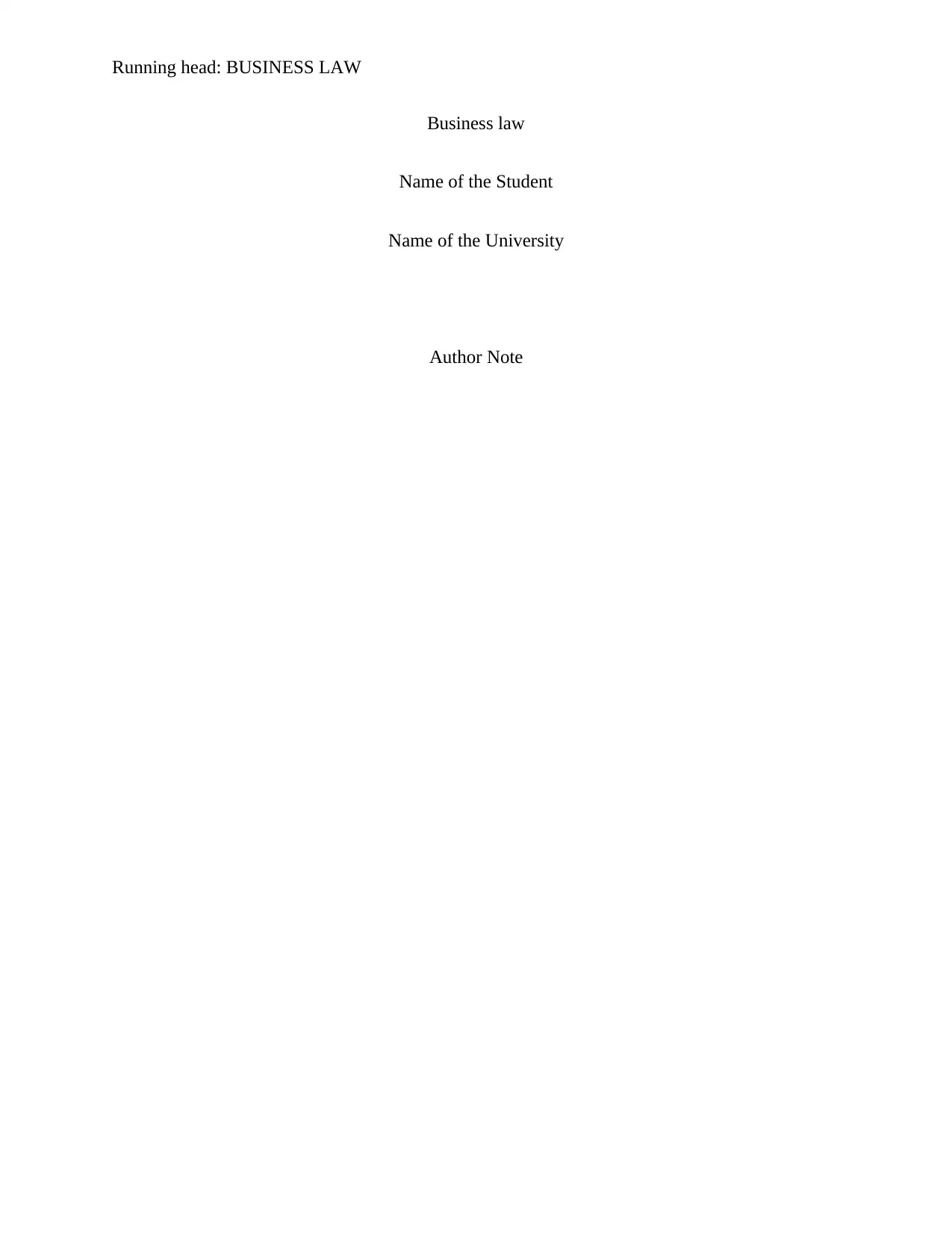
Running head: BUSINESS LAW
Business law
Name of the Student
Name of the University
Author Note
Business law
Name of the Student
Name of the University
Author Note
Paraphrase This Document
Need a fresh take? Get an instant paraphrase of this document with our AI Paraphraser
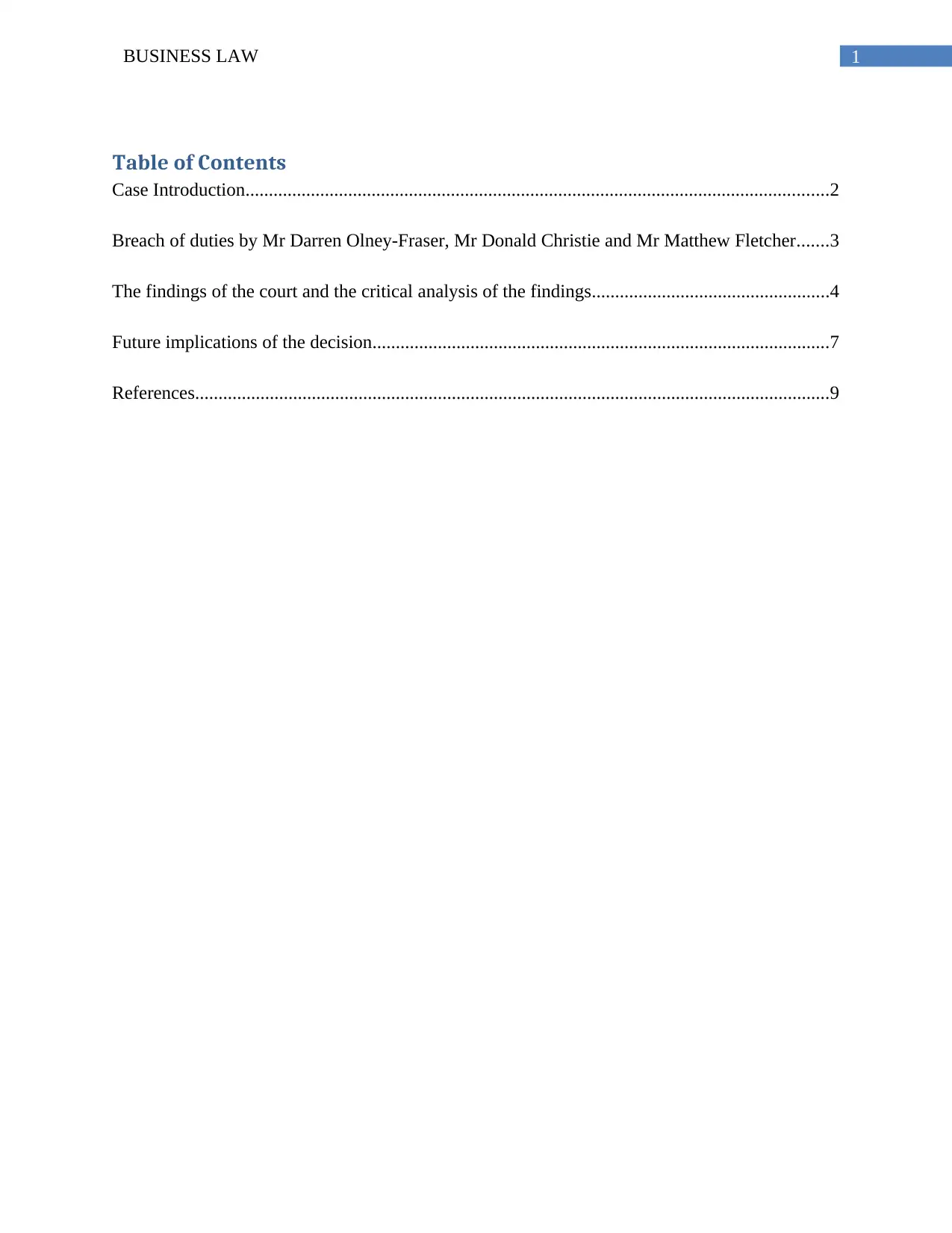
1BUSINESS LAW
Table of Contents
Case Introduction.............................................................................................................................2
Breach of duties by Mr Darren Olney-Fraser, Mr Donald Christie and Mr Matthew Fletcher.......3
The findings of the court and the critical analysis of the findings...................................................4
Future implications of the decision..................................................................................................7
References........................................................................................................................................9
Table of Contents
Case Introduction.............................................................................................................................2
Breach of duties by Mr Darren Olney-Fraser, Mr Donald Christie and Mr Matthew Fletcher.......3
The findings of the court and the critical analysis of the findings...................................................4
Future implications of the decision..................................................................................................7
References........................................................................................................................................9
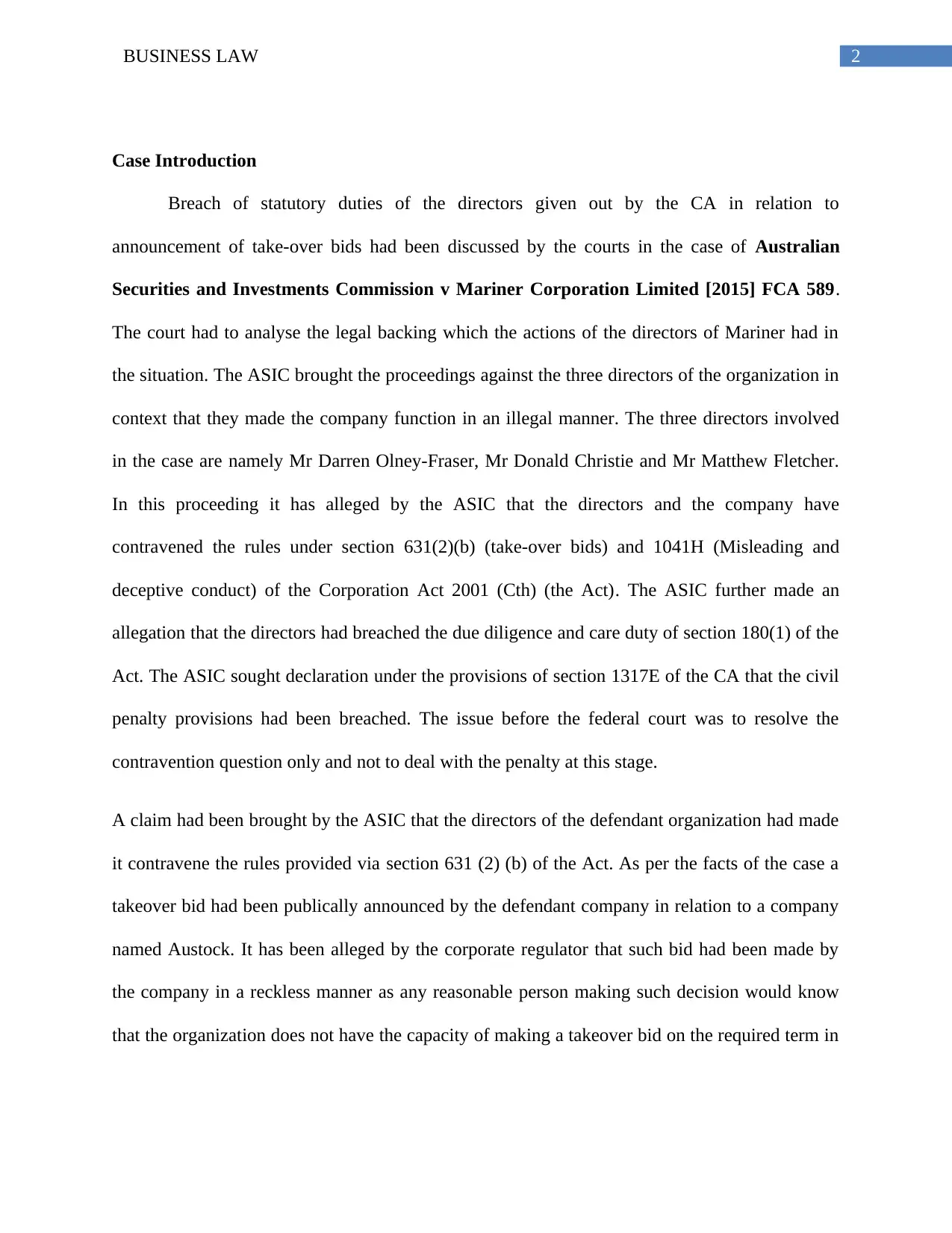
2BUSINESS LAW
Case Introduction
Breach of statutory duties of the directors given out by the CA in relation to
announcement of take-over bids had been discussed by the courts in the case of Australian
Securities and Investments Commission v Mariner Corporation Limited [2015] FCA 589.
The court had to analyse the legal backing which the actions of the directors of Mariner had in
the situation. The ASIC brought the proceedings against the three directors of the organization in
context that they made the company function in an illegal manner. The three directors involved
in the case are namely Mr Darren Olney-Fraser, Mr Donald Christie and Mr Matthew Fletcher.
In this proceeding it has alleged by the ASIC that the directors and the company have
contravened the rules under section 631(2)(b) (take-over bids) and 1041H (Misleading and
deceptive conduct) of the Corporation Act 2001 (Cth) (the Act). The ASIC further made an
allegation that the directors had breached the due diligence and care duty of section 180(1) of the
Act. The ASIC sought declaration under the provisions of section 1317E of the CA that the civil
penalty provisions had been breached. The issue before the federal court was to resolve the
contravention question only and not to deal with the penalty at this stage.
A claim had been brought by the ASIC that the directors of the defendant organization had made
it contravene the rules provided via section 631 (2) (b) of the Act. As per the facts of the case a
takeover bid had been publically announced by the defendant company in relation to a company
named Austock. It has been alleged by the corporate regulator that such bid had been made by
the company in a reckless manner as any reasonable person making such decision would know
that the organization does not have the capacity of making a takeover bid on the required term in
Case Introduction
Breach of statutory duties of the directors given out by the CA in relation to
announcement of take-over bids had been discussed by the courts in the case of Australian
Securities and Investments Commission v Mariner Corporation Limited [2015] FCA 589.
The court had to analyse the legal backing which the actions of the directors of Mariner had in
the situation. The ASIC brought the proceedings against the three directors of the organization in
context that they made the company function in an illegal manner. The three directors involved
in the case are namely Mr Darren Olney-Fraser, Mr Donald Christie and Mr Matthew Fletcher.
In this proceeding it has alleged by the ASIC that the directors and the company have
contravened the rules under section 631(2)(b) (take-over bids) and 1041H (Misleading and
deceptive conduct) of the Corporation Act 2001 (Cth) (the Act). The ASIC further made an
allegation that the directors had breached the due diligence and care duty of section 180(1) of the
Act. The ASIC sought declaration under the provisions of section 1317E of the CA that the civil
penalty provisions had been breached. The issue before the federal court was to resolve the
contravention question only and not to deal with the penalty at this stage.
A claim had been brought by the ASIC that the directors of the defendant organization had made
it contravene the rules provided via section 631 (2) (b) of the Act. As per the facts of the case a
takeover bid had been publically announced by the defendant company in relation to a company
named Austock. It has been alleged by the corporate regulator that such bid had been made by
the company in a reckless manner as any reasonable person making such decision would know
that the organization does not have the capacity of making a takeover bid on the required term in
⊘ This is a preview!⊘
Do you want full access?
Subscribe today to unlock all pages.

Trusted by 1+ million students worldwide
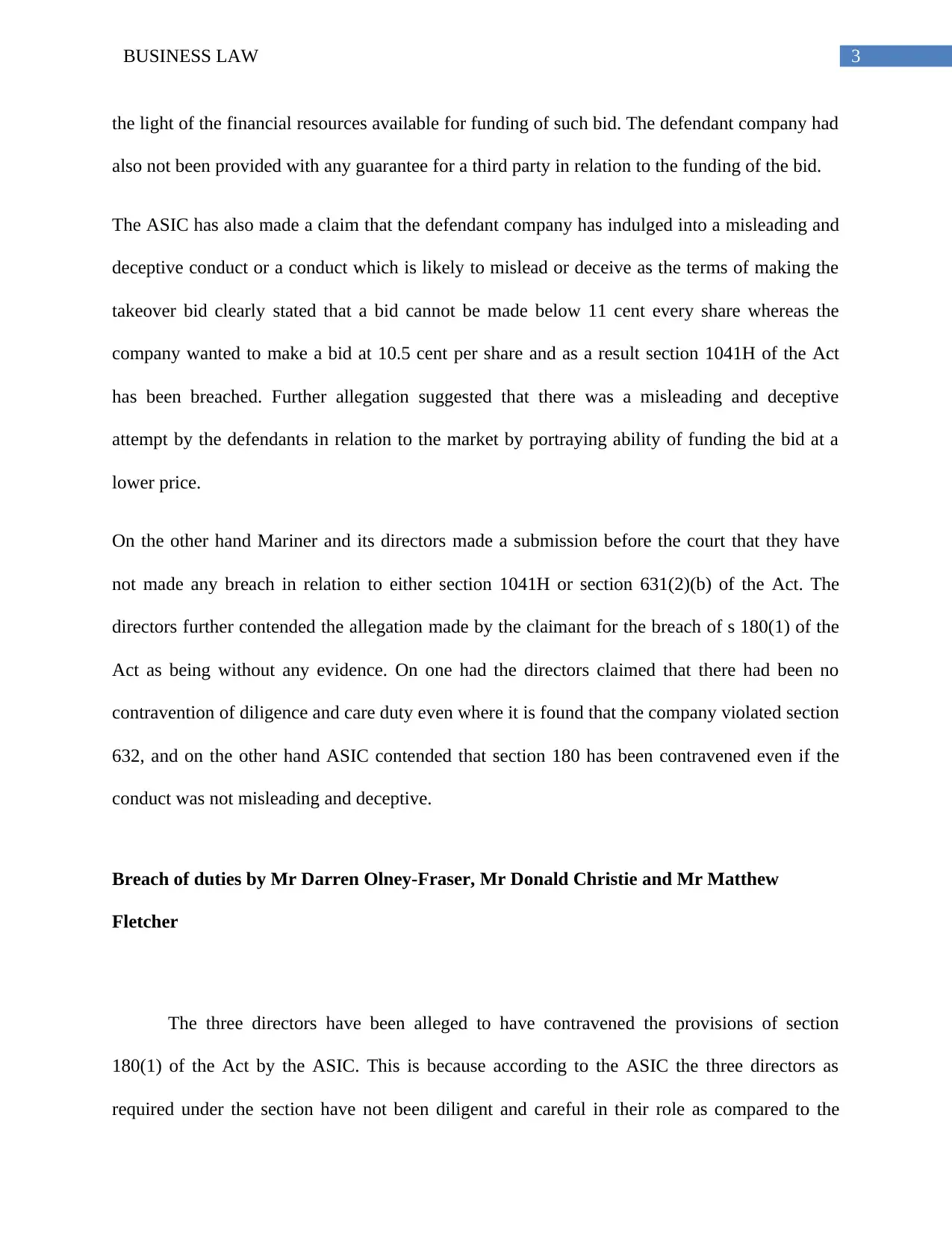
3BUSINESS LAW
the light of the financial resources available for funding of such bid. The defendant company had
also not been provided with any guarantee for a third party in relation to the funding of the bid.
The ASIC has also made a claim that the defendant company has indulged into a misleading and
deceptive conduct or a conduct which is likely to mislead or deceive as the terms of making the
takeover bid clearly stated that a bid cannot be made below 11 cent every share whereas the
company wanted to make a bid at 10.5 cent per share and as a result section 1041H of the Act
has been breached. Further allegation suggested that there was a misleading and deceptive
attempt by the defendants in relation to the market by portraying ability of funding the bid at a
lower price.
On the other hand Mariner and its directors made a submission before the court that they have
not made any breach in relation to either section 1041H or section 631(2)(b) of the Act. The
directors further contended the allegation made by the claimant for the breach of s 180(1) of the
Act as being without any evidence. On one had the directors claimed that there had been no
contravention of diligence and care duty even where it is found that the company violated section
632, and on the other hand ASIC contended that section 180 has been contravened even if the
conduct was not misleading and deceptive.
Breach of duties by Mr Darren Olney-Fraser, Mr Donald Christie and Mr Matthew
Fletcher
The three directors have been alleged to have contravened the provisions of section
180(1) of the Act by the ASIC. This is because according to the ASIC the three directors as
required under the section have not been diligent and careful in their role as compared to the
the light of the financial resources available for funding of such bid. The defendant company had
also not been provided with any guarantee for a third party in relation to the funding of the bid.
The ASIC has also made a claim that the defendant company has indulged into a misleading and
deceptive conduct or a conduct which is likely to mislead or deceive as the terms of making the
takeover bid clearly stated that a bid cannot be made below 11 cent every share whereas the
company wanted to make a bid at 10.5 cent per share and as a result section 1041H of the Act
has been breached. Further allegation suggested that there was a misleading and deceptive
attempt by the defendants in relation to the market by portraying ability of funding the bid at a
lower price.
On the other hand Mariner and its directors made a submission before the court that they have
not made any breach in relation to either section 1041H or section 631(2)(b) of the Act. The
directors further contended the allegation made by the claimant for the breach of s 180(1) of the
Act as being without any evidence. On one had the directors claimed that there had been no
contravention of diligence and care duty even where it is found that the company violated section
632, and on the other hand ASIC contended that section 180 has been contravened even if the
conduct was not misleading and deceptive.
Breach of duties by Mr Darren Olney-Fraser, Mr Donald Christie and Mr Matthew
Fletcher
The three directors have been alleged to have contravened the provisions of section
180(1) of the Act by the ASIC. This is because according to the ASIC the three directors as
required under the section have not been diligent and careful in their role as compared to the
Paraphrase This Document
Need a fresh take? Get an instant paraphrase of this document with our AI Paraphraser
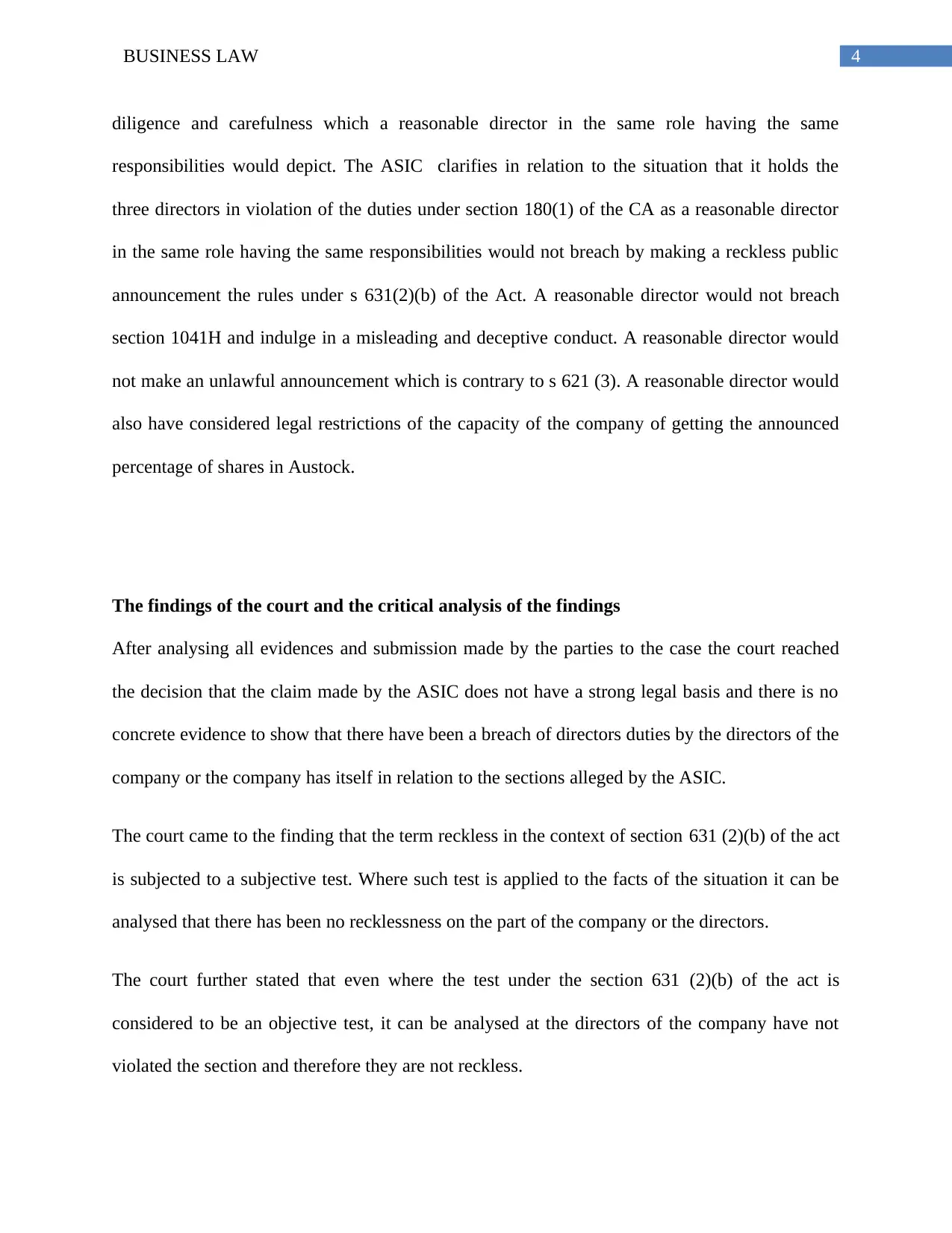
4BUSINESS LAW
diligence and carefulness which a reasonable director in the same role having the same
responsibilities would depict. The ASIC clarifies in relation to the situation that it holds the
three directors in violation of the duties under section 180(1) of the CA as a reasonable director
in the same role having the same responsibilities would not breach by making a reckless public
announcement the rules under s 631(2)(b) of the Act. A reasonable director would not breach
section 1041H and indulge in a misleading and deceptive conduct. A reasonable director would
not make an unlawful announcement which is contrary to s 621 (3). A reasonable director would
also have considered legal restrictions of the capacity of the company of getting the announced
percentage of shares in Austock.
The findings of the court and the critical analysis of the findings
After analysing all evidences and submission made by the parties to the case the court reached
the decision that the claim made by the ASIC does not have a strong legal basis and there is no
concrete evidence to show that there have been a breach of directors duties by the directors of the
company or the company has itself in relation to the sections alleged by the ASIC.
The court came to the finding that the term reckless in the context of section 631 (2)(b) of the act
is subjected to a subjective test. Where such test is applied to the facts of the situation it can be
analysed that there has been no recklessness on the part of the company or the directors.
The court further stated that even where the test under the section 631 (2)(b) of the act is
considered to be an objective test, it can be analysed at the directors of the company have not
violated the section and therefore they are not reckless.
diligence and carefulness which a reasonable director in the same role having the same
responsibilities would depict. The ASIC clarifies in relation to the situation that it holds the
three directors in violation of the duties under section 180(1) of the CA as a reasonable director
in the same role having the same responsibilities would not breach by making a reckless public
announcement the rules under s 631(2)(b) of the Act. A reasonable director would not breach
section 1041H and indulge in a misleading and deceptive conduct. A reasonable director would
not make an unlawful announcement which is contrary to s 621 (3). A reasonable director would
also have considered legal restrictions of the capacity of the company of getting the announced
percentage of shares in Austock.
The findings of the court and the critical analysis of the findings
After analysing all evidences and submission made by the parties to the case the court reached
the decision that the claim made by the ASIC does not have a strong legal basis and there is no
concrete evidence to show that there have been a breach of directors duties by the directors of the
company or the company has itself in relation to the sections alleged by the ASIC.
The court came to the finding that the term reckless in the context of section 631 (2)(b) of the act
is subjected to a subjective test. Where such test is applied to the facts of the situation it can be
analysed that there has been no recklessness on the part of the company or the directors.
The court further stated that even where the test under the section 631 (2)(b) of the act is
considered to be an objective test, it can be analysed at the directors of the company have not
violated the section and therefore they are not reckless.
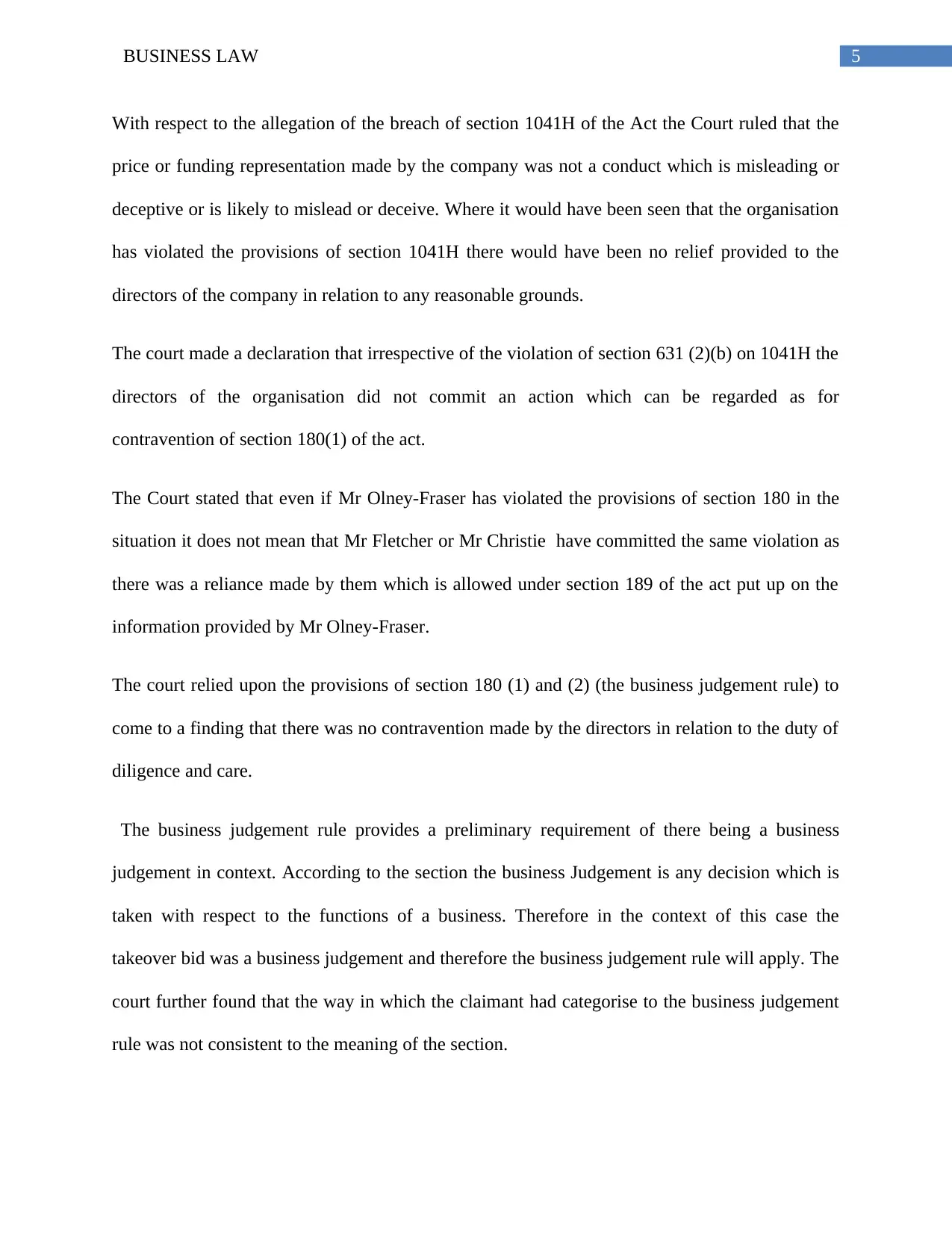
5BUSINESS LAW
With respect to the allegation of the breach of section 1041H of the Act the Court ruled that the
price or funding representation made by the company was not a conduct which is misleading or
deceptive or is likely to mislead or deceive. Where it would have been seen that the organisation
has violated the provisions of section 1041H there would have been no relief provided to the
directors of the company in relation to any reasonable grounds.
The court made a declaration that irrespective of the violation of section 631 (2)(b) on 1041H the
directors of the organisation did not commit an action which can be regarded as for
contravention of section 180(1) of the act.
The Court stated that even if Mr Olney-Fraser has violated the provisions of section 180 in the
situation it does not mean that Mr Fletcher or Mr Christie have committed the same violation as
there was a reliance made by them which is allowed under section 189 of the act put up on the
information provided by Mr Olney-Fraser.
The court relied upon the provisions of section 180 (1) and (2) (the business judgement rule) to
come to a finding that there was no contravention made by the directors in relation to the duty of
diligence and care.
The business judgement rule provides a preliminary requirement of there being a business
judgement in context. According to the section the business Judgement is any decision which is
taken with respect to the functions of a business. Therefore in the context of this case the
takeover bid was a business judgement and therefore the business judgement rule will apply. The
court further found that the way in which the claimant had categorise to the business judgement
rule was not consistent to the meaning of the section.
With respect to the allegation of the breach of section 1041H of the Act the Court ruled that the
price or funding representation made by the company was not a conduct which is misleading or
deceptive or is likely to mislead or deceive. Where it would have been seen that the organisation
has violated the provisions of section 1041H there would have been no relief provided to the
directors of the company in relation to any reasonable grounds.
The court made a declaration that irrespective of the violation of section 631 (2)(b) on 1041H the
directors of the organisation did not commit an action which can be regarded as for
contravention of section 180(1) of the act.
The Court stated that even if Mr Olney-Fraser has violated the provisions of section 180 in the
situation it does not mean that Mr Fletcher or Mr Christie have committed the same violation as
there was a reliance made by them which is allowed under section 189 of the act put up on the
information provided by Mr Olney-Fraser.
The court relied upon the provisions of section 180 (1) and (2) (the business judgement rule) to
come to a finding that there was no contravention made by the directors in relation to the duty of
diligence and care.
The business judgement rule provides a preliminary requirement of there being a business
judgement in context. According to the section the business Judgement is any decision which is
taken with respect to the functions of a business. Therefore in the context of this case the
takeover bid was a business judgement and therefore the business judgement rule will apply. The
court further found that the way in which the claimant had categorise to the business judgement
rule was not consistent to the meaning of the section.
⊘ This is a preview!⊘
Do you want full access?
Subscribe today to unlock all pages.

Trusted by 1+ million students worldwide
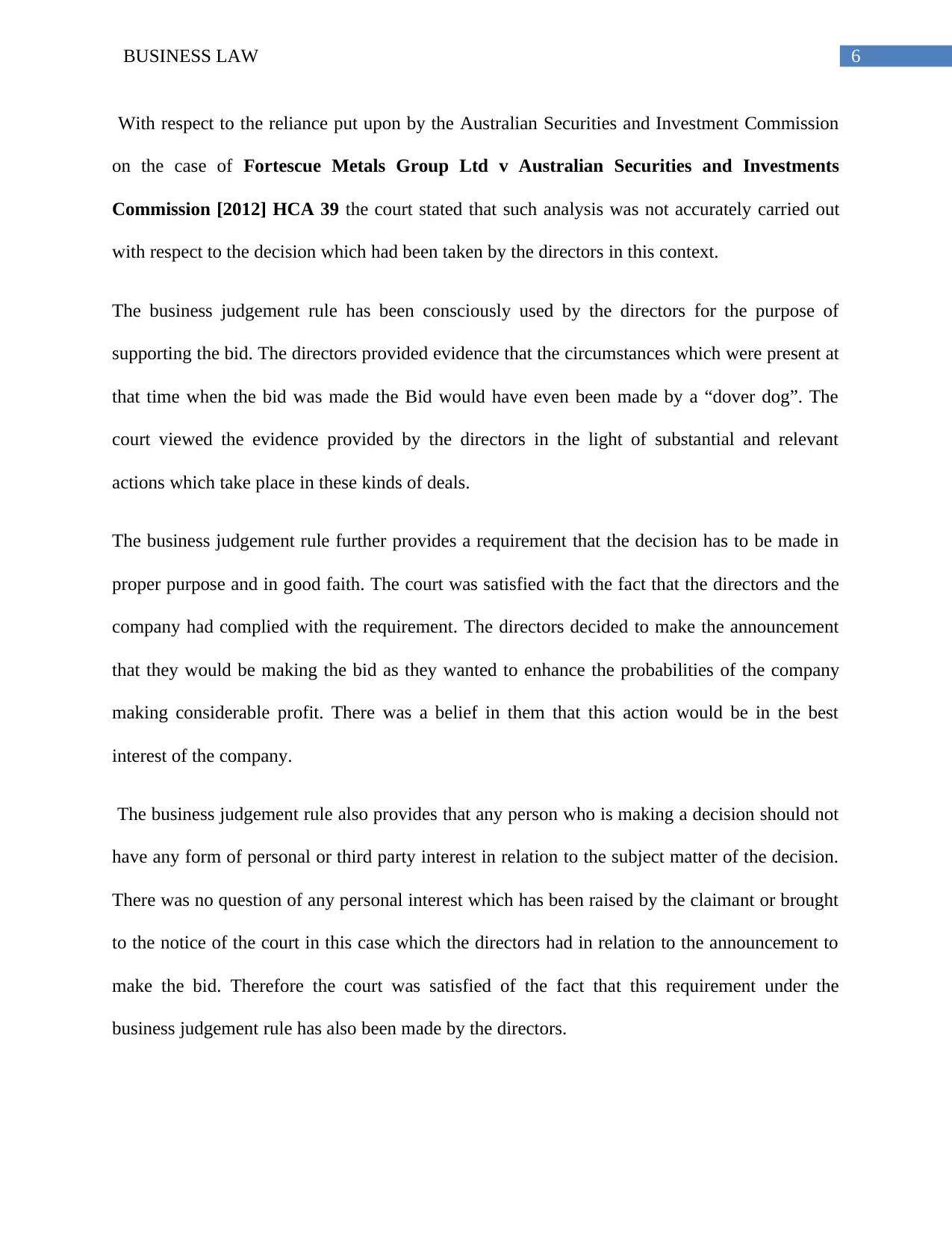
6BUSINESS LAW
With respect to the reliance put upon by the Australian Securities and Investment Commission
on the case of Fortescue Metals Group Ltd v Australian Securities and Investments
Commission [2012] HCA 39 the court stated that such analysis was not accurately carried out
with respect to the decision which had been taken by the directors in this context.
The business judgement rule has been consciously used by the directors for the purpose of
supporting the bid. The directors provided evidence that the circumstances which were present at
that time when the bid was made the Bid would have even been made by a “dover dog”. The
court viewed the evidence provided by the directors in the light of substantial and relevant
actions which take place in these kinds of deals.
The business judgement rule further provides a requirement that the decision has to be made in
proper purpose and in good faith. The court was satisfied with the fact that the directors and the
company had complied with the requirement. The directors decided to make the announcement
that they would be making the bid as they wanted to enhance the probabilities of the company
making considerable profit. There was a belief in them that this action would be in the best
interest of the company.
The business judgement rule also provides that any person who is making a decision should not
have any form of personal or third party interest in relation to the subject matter of the decision.
There was no question of any personal interest which has been raised by the claimant or brought
to the notice of the court in this case which the directors had in relation to the announcement to
make the bid. Therefore the court was satisfied of the fact that this requirement under the
business judgement rule has also been made by the directors.
With respect to the reliance put upon by the Australian Securities and Investment Commission
on the case of Fortescue Metals Group Ltd v Australian Securities and Investments
Commission [2012] HCA 39 the court stated that such analysis was not accurately carried out
with respect to the decision which had been taken by the directors in this context.
The business judgement rule has been consciously used by the directors for the purpose of
supporting the bid. The directors provided evidence that the circumstances which were present at
that time when the bid was made the Bid would have even been made by a “dover dog”. The
court viewed the evidence provided by the directors in the light of substantial and relevant
actions which take place in these kinds of deals.
The business judgement rule further provides a requirement that the decision has to be made in
proper purpose and in good faith. The court was satisfied with the fact that the directors and the
company had complied with the requirement. The directors decided to make the announcement
that they would be making the bid as they wanted to enhance the probabilities of the company
making considerable profit. There was a belief in them that this action would be in the best
interest of the company.
The business judgement rule also provides that any person who is making a decision should not
have any form of personal or third party interest in relation to the subject matter of the decision.
There was no question of any personal interest which has been raised by the claimant or brought
to the notice of the court in this case which the directors had in relation to the announcement to
make the bid. Therefore the court was satisfied of the fact that this requirement under the
business judgement rule has also been made by the directors.
Paraphrase This Document
Need a fresh take? Get an instant paraphrase of this document with our AI Paraphraser
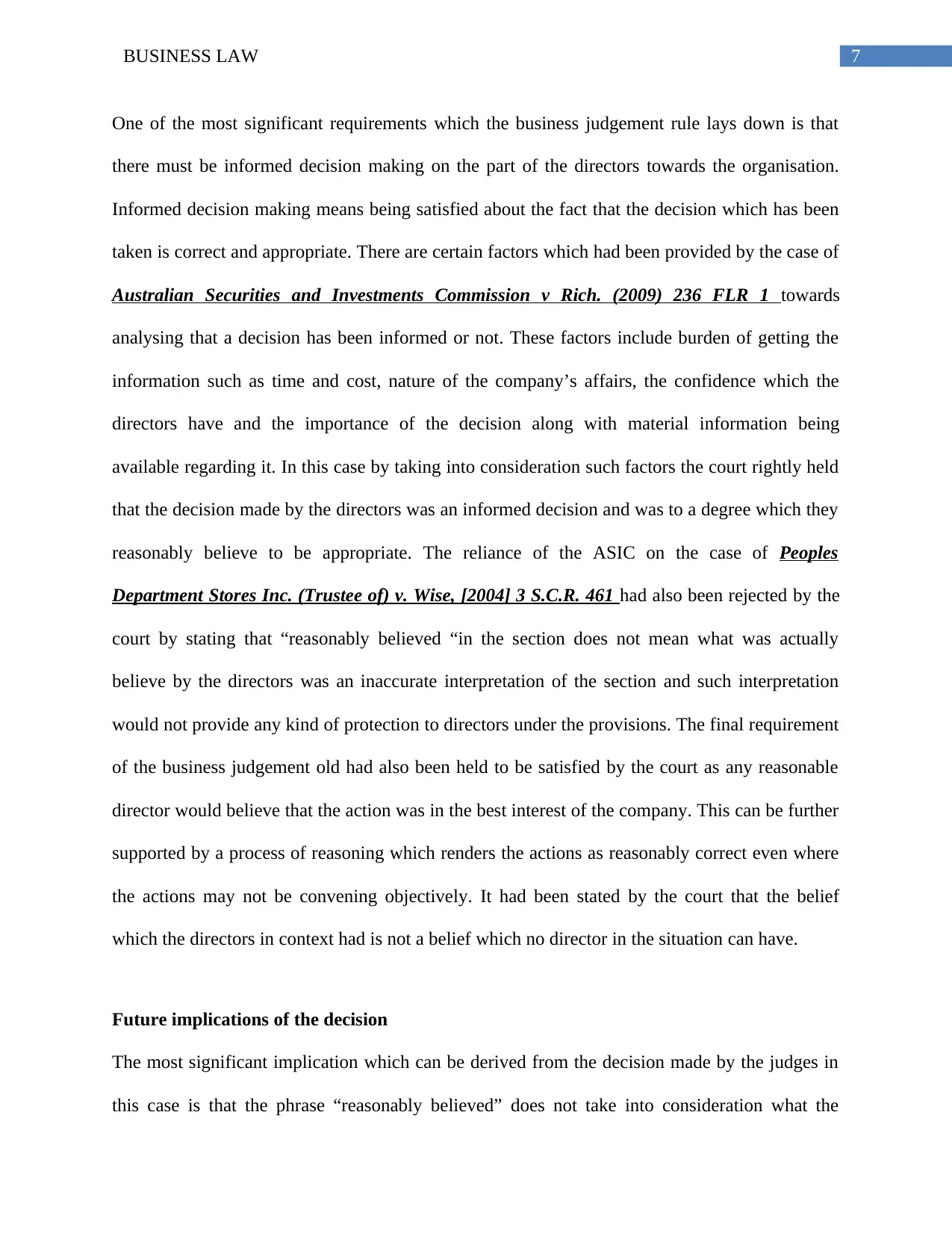
7BUSINESS LAW
One of the most significant requirements which the business judgement rule lays down is that
there must be informed decision making on the part of the directors towards the organisation.
Informed decision making means being satisfied about the fact that the decision which has been
taken is correct and appropriate. There are certain factors which had been provided by the case of
Australian Securities and Investments Commission v Rich. (2009) 236 FLR 1 towards
analysing that a decision has been informed or not. These factors include burden of getting the
information such as time and cost, nature of the company’s affairs, the confidence which the
directors have and the importance of the decision along with material information being
available regarding it. In this case by taking into consideration such factors the court rightly held
that the decision made by the directors was an informed decision and was to a degree which they
reasonably believe to be appropriate. The reliance of the ASIC on the case of Peoples
Department Stores Inc. (Trustee of) v. Wise, [2004] 3 S.C.R. 461 had also been rejected by the
court by stating that “reasonably believed “in the section does not mean what was actually
believe by the directors was an inaccurate interpretation of the section and such interpretation
would not provide any kind of protection to directors under the provisions. The final requirement
of the business judgement old had also been held to be satisfied by the court as any reasonable
director would believe that the action was in the best interest of the company. This can be further
supported by a process of reasoning which renders the actions as reasonably correct even where
the actions may not be convening objectively. It had been stated by the court that the belief
which the directors in context had is not a belief which no director in the situation can have.
Future implications of the decision
The most significant implication which can be derived from the decision made by the judges in
this case is that the phrase “reasonably believed” does not take into consideration what the
One of the most significant requirements which the business judgement rule lays down is that
there must be informed decision making on the part of the directors towards the organisation.
Informed decision making means being satisfied about the fact that the decision which has been
taken is correct and appropriate. There are certain factors which had been provided by the case of
Australian Securities and Investments Commission v Rich. (2009) 236 FLR 1 towards
analysing that a decision has been informed or not. These factors include burden of getting the
information such as time and cost, nature of the company’s affairs, the confidence which the
directors have and the importance of the decision along with material information being
available regarding it. In this case by taking into consideration such factors the court rightly held
that the decision made by the directors was an informed decision and was to a degree which they
reasonably believe to be appropriate. The reliance of the ASIC on the case of Peoples
Department Stores Inc. (Trustee of) v. Wise, [2004] 3 S.C.R. 461 had also been rejected by the
court by stating that “reasonably believed “in the section does not mean what was actually
believe by the directors was an inaccurate interpretation of the section and such interpretation
would not provide any kind of protection to directors under the provisions. The final requirement
of the business judgement old had also been held to be satisfied by the court as any reasonable
director would believe that the action was in the best interest of the company. This can be further
supported by a process of reasoning which renders the actions as reasonably correct even where
the actions may not be convening objectively. It had been stated by the court that the belief
which the directors in context had is not a belief which no director in the situation can have.
Future implications of the decision
The most significant implication which can be derived from the decision made by the judges in
this case is that the phrase “reasonably believed” does not take into consideration what the
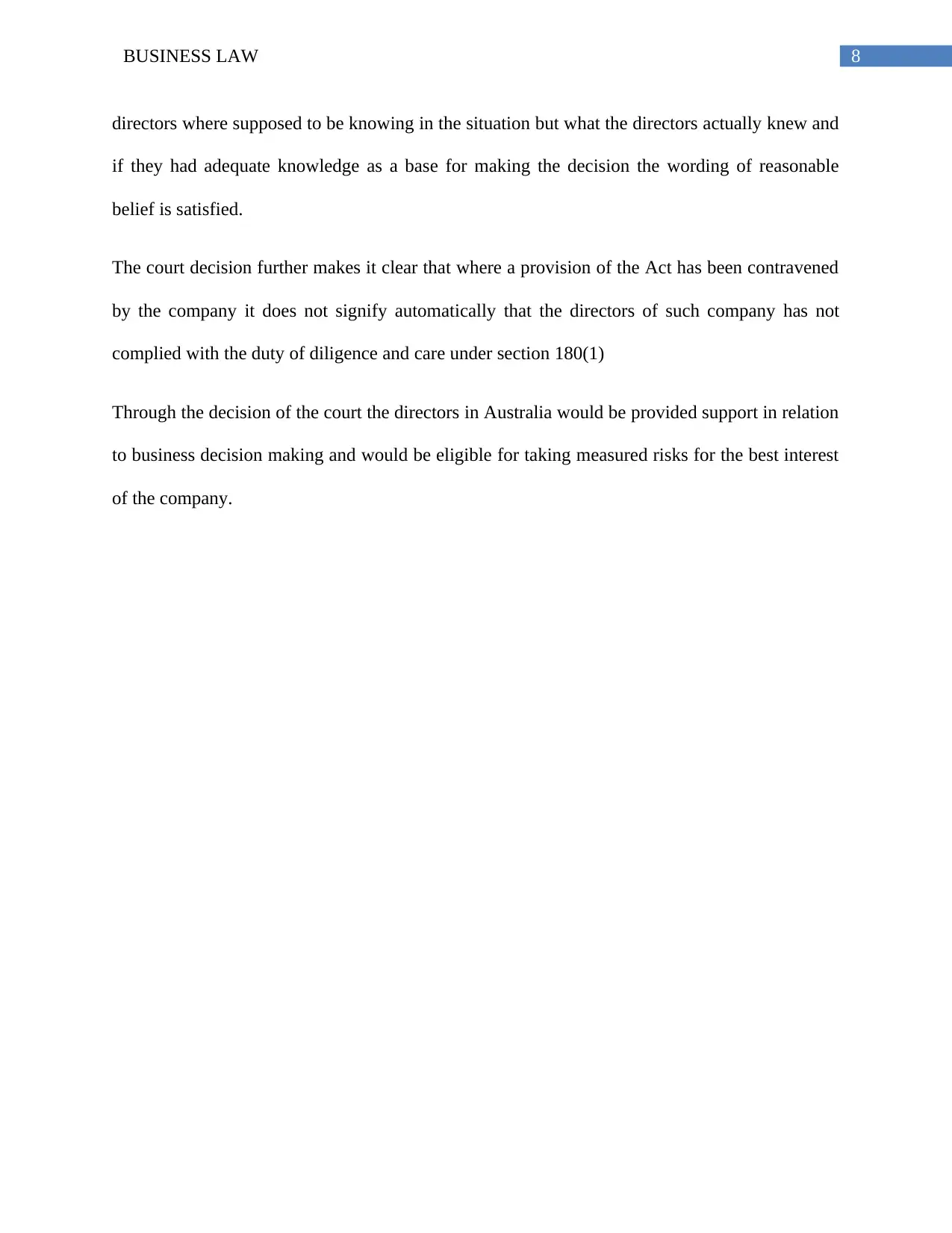
8BUSINESS LAW
directors where supposed to be knowing in the situation but what the directors actually knew and
if they had adequate knowledge as a base for making the decision the wording of reasonable
belief is satisfied.
The court decision further makes it clear that where a provision of the Act has been contravened
by the company it does not signify automatically that the directors of such company has not
complied with the duty of diligence and care under section 180(1)
Through the decision of the court the directors in Australia would be provided support in relation
to business decision making and would be eligible for taking measured risks for the best interest
of the company.
directors where supposed to be knowing in the situation but what the directors actually knew and
if they had adequate knowledge as a base for making the decision the wording of reasonable
belief is satisfied.
The court decision further makes it clear that where a provision of the Act has been contravened
by the company it does not signify automatically that the directors of such company has not
complied with the duty of diligence and care under section 180(1)
Through the decision of the court the directors in Australia would be provided support in relation
to business decision making and would be eligible for taking measured risks for the best interest
of the company.
⊘ This is a preview!⊘
Do you want full access?
Subscribe today to unlock all pages.

Trusted by 1+ million students worldwide
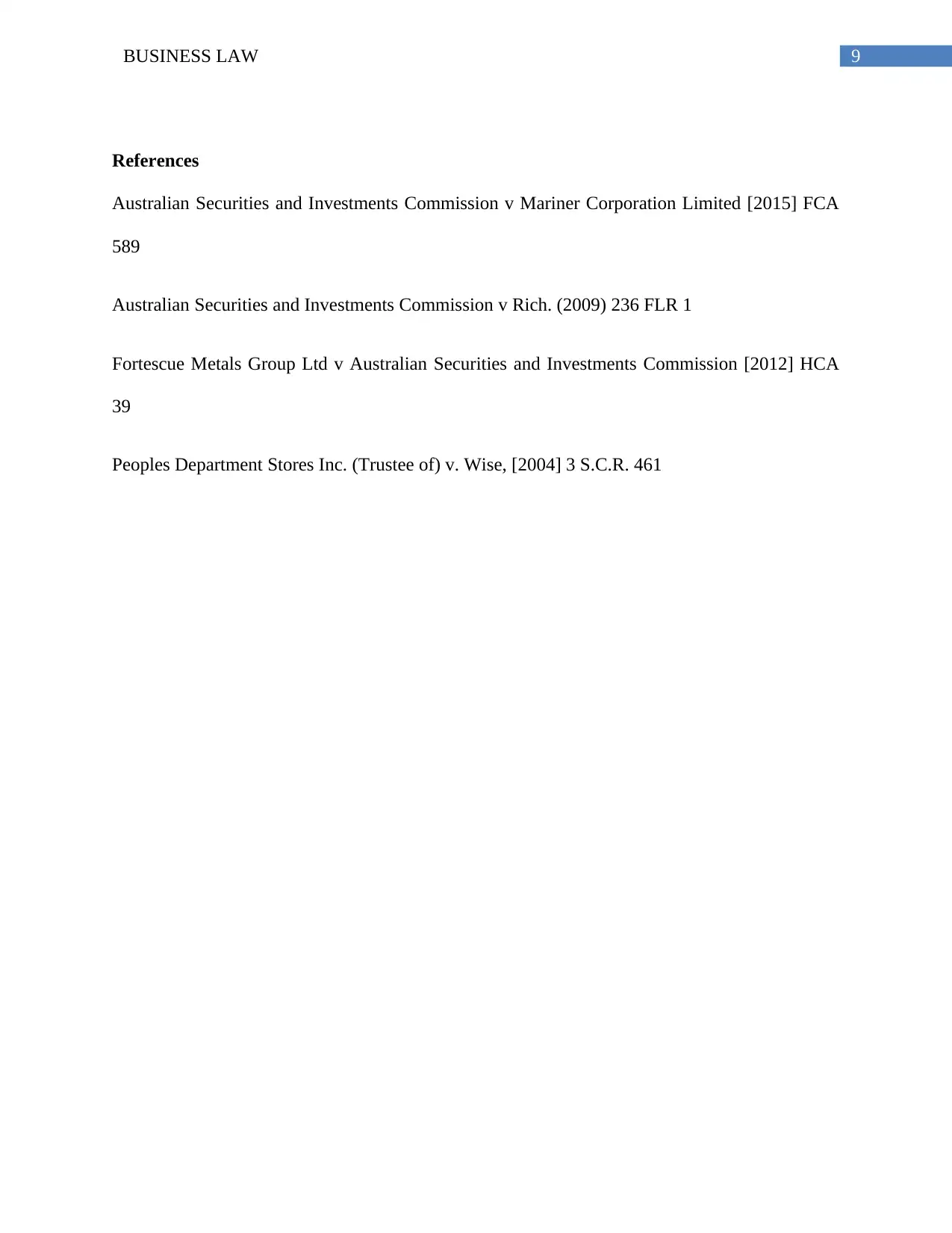
9BUSINESS LAW
References
Australian Securities and Investments Commission v Mariner Corporation Limited [2015] FCA
589
Australian Securities and Investments Commission v Rich. (2009) 236 FLR 1
Fortescue Metals Group Ltd v Australian Securities and Investments Commission [2012] HCA
39
Peoples Department Stores Inc. (Trustee of) v. Wise, [2004] 3 S.C.R. 461
References
Australian Securities and Investments Commission v Mariner Corporation Limited [2015] FCA
589
Australian Securities and Investments Commission v Rich. (2009) 236 FLR 1
Fortescue Metals Group Ltd v Australian Securities and Investments Commission [2012] HCA
39
Peoples Department Stores Inc. (Trustee of) v. Wise, [2004] 3 S.C.R. 461
1 out of 10
Related Documents
Your All-in-One AI-Powered Toolkit for Academic Success.
+13062052269
info@desklib.com
Available 24*7 on WhatsApp / Email
![[object Object]](/_next/static/media/star-bottom.7253800d.svg)
Unlock your academic potential
Copyright © 2020–2026 A2Z Services. All Rights Reserved. Developed and managed by ZUCOL.

![Analysis of ASIC v Mariner Corporation Limited [2015] FCA 589 Decision](/_next/image/?url=https%3A%2F%2Fdesklib.com%2Fmedia%2Fimages%2Fqj%2F30a3ee1c1e57462ba500246341ad4101.jpg&w=256&q=75)



